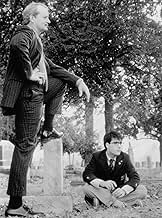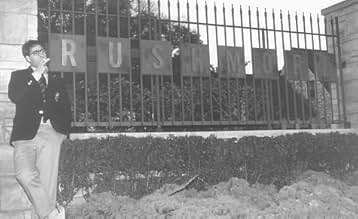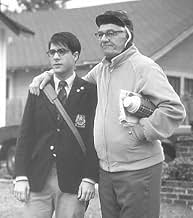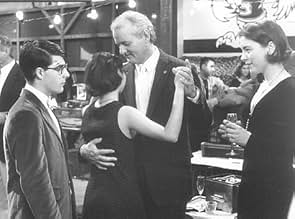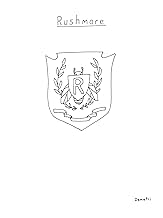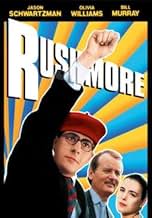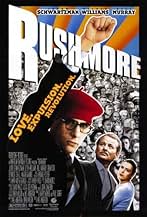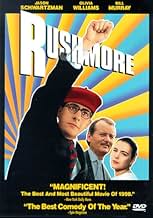- Prêmios
- 16 vitórias e 16 indicações no total
Dipak Pallana
- Mr. Adams
- (as Deepak Pallana)
- Direção
- Roteiristas
- Elenco e equipe completos
- Produção, bilheteria e muito mais no IMDbPro
Avaliações em destaque
Rushmore was the first Wes Anderson film I saw, and I didn't think much of it the first time. I used to think that Royal Tenenbaums was Anderson's first good film. I thought Bottle Rocket wore its rookie status on its sleeve; I thought Rushmore was flawed; and I thought Tenenbaums finally showed that Anderson had honed his craft and he would start making great films. I then re-watched Tenenbaums and found it to be even more satisfying on additional viewings. I realized that Anderson had actually crafted one of those rare pieces of cinema that reveals itself more and more upon repeat viewings. So I of course decided to give Rushmore a second look.
Now that I've had a chance to see the DVD, I've had a much different experience viewing the film. Perhaps because I saw it on Pan and Scan VHS previously? Or perhaps because Anderson's vision requires an adjustment period?
Some people will never like Anderson's films. They simply will not appeal to those out there who want clichéd Hollywood fodder. Some people will love Anderson's films from the moment they see them. Others, like myself, will need to see the films more than once to truly appreciate them. Anderson breaks convention in ways no one has done before - One has to understand that his films are deep where most films are shallow, and shallow where most films are deep. This will throw A LOT of people off, as evidenced by many of the comments on the message boards. Anderson's films begin where others end. In Rushmore, we see Max's fall from grace, not his climb up to become head of every club in his school. In Tenenbaums, we see the aftermath of the child prodigies, not their glory years. Again, this will throw a lot of people off, and indeed I heard this criticism of Tenenbaums quite a lot. Anderson constructs the world of his films around a cinema storybook. They are episodic, told in chapters. Some will find Anderson at first glance to be a rather egotistical filmmaker, as I once did. However, upon second glance, you can begin to see the rich text woven deeper in the films that might be hidden beneath quirkiness or drastic breaks from convention. The first time I saw Rushmore, I felt shock, embarrassment and confusion (Mostly at Max and Rosemary's bizarre interaction). I was lost and unfamiliar with this world Anderson has created. The second time I saw the film I felt Passion, Love, Tragedy and ultimate Redemption. I found the heart in Anderson's film.
If you felt Rushmore was not all it could have been the first time you saw it, please give it another chance. You'll find which side you fall on.
Now that I've had a chance to see the DVD, I've had a much different experience viewing the film. Perhaps because I saw it on Pan and Scan VHS previously? Or perhaps because Anderson's vision requires an adjustment period?
Some people will never like Anderson's films. They simply will not appeal to those out there who want clichéd Hollywood fodder. Some people will love Anderson's films from the moment they see them. Others, like myself, will need to see the films more than once to truly appreciate them. Anderson breaks convention in ways no one has done before - One has to understand that his films are deep where most films are shallow, and shallow where most films are deep. This will throw A LOT of people off, as evidenced by many of the comments on the message boards. Anderson's films begin where others end. In Rushmore, we see Max's fall from grace, not his climb up to become head of every club in his school. In Tenenbaums, we see the aftermath of the child prodigies, not their glory years. Again, this will throw a lot of people off, and indeed I heard this criticism of Tenenbaums quite a lot. Anderson constructs the world of his films around a cinema storybook. They are episodic, told in chapters. Some will find Anderson at first glance to be a rather egotistical filmmaker, as I once did. However, upon second glance, you can begin to see the rich text woven deeper in the films that might be hidden beneath quirkiness or drastic breaks from convention. The first time I saw Rushmore, I felt shock, embarrassment and confusion (Mostly at Max and Rosemary's bizarre interaction). I was lost and unfamiliar with this world Anderson has created. The second time I saw the film I felt Passion, Love, Tragedy and ultimate Redemption. I found the heart in Anderson's film.
If you felt Rushmore was not all it could have been the first time you saw it, please give it another chance. You'll find which side you fall on.
Wes Anderson's first big success came with "Rushmore," released in 1998.
And with approval I can say that it is a funny movie. With characters like Max Fischer (played by Jason Schwartzman) or Herman Blume (played by Bill Murray), it features two unique and compelling characters. They made me really laugh several times. Especially in the first half of Max with subliminal jokes.
It's an unusual plot. Sometimes with humor, sometimes with full seriousness, about love and friendship to ambition and passion. Although the plot does not always follow the same direction and digresses from time to time, nevertheless, development in character and plot can be seen.
It is a film of the classic kind. Anderson's unique film style as in "Grand Budapest Hotel" or other films is not yet pronounced. Nevertheless, the film is produced in a high quality.
And with approval I can say that it is a funny movie. With characters like Max Fischer (played by Jason Schwartzman) or Herman Blume (played by Bill Murray), it features two unique and compelling characters. They made me really laugh several times. Especially in the first half of Max with subliminal jokes.
It's an unusual plot. Sometimes with humor, sometimes with full seriousness, about love and friendship to ambition and passion. Although the plot does not always follow the same direction and digresses from time to time, nevertheless, development in character and plot can be seen.
It is a film of the classic kind. Anderson's unique film style as in "Grand Budapest Hotel" or other films is not yet pronounced. Nevertheless, the film is produced in a high quality.
Very rarely can a director evoke so much awkwardness and kindness from his/her silent moments in their films. Wes Anderson is one filmmaker who can. His characters are so richly drawn, finely acted and beautifully directed, that even when they're not speaking... we can read their emotions, we feel their pain. Young Jason Swartzman gives a fantastic performance. Even nicer is the surprise turn by Bill Murray, who manages to play a good guy and a villain at the same time. In one scene he is wearing Budweiser boxer shorts on a diving board. He is smoking a cigarette and jumps, doing a cannonball into his sewer-ridden pool. We see him curled up at the bottom of his pool, drowning himself in misery. Is this a connection to his future lover's dead husband? Who knows. But what we do know is that Anderson has crafted his film to star the most unlikely of heroes. They are the oddest of the bunch, but at the same time we know what they are going through. Their oddness aside, what we learn to see more of, is their hearts. It is obvious Anderson has wiped his heart all over this piece, and it pays off more than I'm sure he ever could have imagined.
Max Fischer (Jason Schwartzman) is an odd friendless teen at a private school with lots of useless extracurricular activities. He get put on academic probation, and falls obsessively in love with elementary teacher Miss Cross (Olivia Williams). He befriends an equally odd wealthy Herman Blume (Bill Murray), the owner of a pipe company. She dates Dr. Peter Flynn (Luke Wilson) which raises the ire of Max. Then Herman becomes infatuated with the lovely teacher and Max gets kicked out of private school.
These are truly uncompromisingly odd characters. They are a quirky unconventional group. They are not immediately hilarious but funny in how wacky Schwartzman gets. The dialog is sharp with a lot of unusual Wes Anderson takes. Bill Murray extends his range starting an acting relationship with Wes. It's a wonderful move forward for Wes and friends.
These are truly uncompromisingly odd characters. They are a quirky unconventional group. They are not immediately hilarious but funny in how wacky Schwartzman gets. The dialog is sharp with a lot of unusual Wes Anderson takes. Bill Murray extends his range starting an acting relationship with Wes. It's a wonderful move forward for Wes and friends.
10DaniVT88
Wes Anderson's Rushmore is a movie full of everything that modern day cinematic crap movies lack; dry humor, unique writing, music that makes a scene unforgettable, and real heart. I feel as though Rushmore is cinematic excellence, Max Fischer is the perfectly flawed yet absolutely brilliant character who tries to find his place in the world, whether it's by engrossing himself in extracurricular activities or pretending he's the son of a neurosurgeon. All of the characters are finely tuned, Herman Blume is a successful man who feels worthless, Miss Cross is a brilliant woman who feels only sorrow because of the loss of her husband. But it is their flaws that make them so wonderful, they aren't boxed into labeled packages, they are raw and real human beings who are just trying to survive. This movie is about, as Max says, finding out what you love and doing it for the rest of your life.
The camera angles in this film are interesting, connecting you to the environment and the characters. Wes Anderson picks the perfect music for each scene, especially for the heartbreaking scene at the end when Miss Cross and Max are dancing to the Faces "Ooh la la." But, what's most brilliant about Rushmore is how it makes you feel; pessimistic yet hopeful, sad yet joyful, confused yet clear-minded. A good movie makes you think but a great movie changes your perspective on the world and this is what Anderson has done. To quote Cousteau, as Miss Cross did in the Diving for Sunken Treasure book, "When one man, for whatever reason, has the opportunity to lead an extraordinary life he has no right to keep it to himself," and I'm glad that Wes Anderson created such an extraordinary movie and shared it with us all.
The camera angles in this film are interesting, connecting you to the environment and the characters. Wes Anderson picks the perfect music for each scene, especially for the heartbreaking scene at the end when Miss Cross and Max are dancing to the Faces "Ooh la la." But, what's most brilliant about Rushmore is how it makes you feel; pessimistic yet hopeful, sad yet joyful, confused yet clear-minded. A good movie makes you think but a great movie changes your perspective on the world and this is what Anderson has done. To quote Cousteau, as Miss Cross did in the Diving for Sunken Treasure book, "When one man, for whatever reason, has the opportunity to lead an extraordinary life he has no right to keep it to himself," and I'm glad that Wes Anderson created such an extraordinary movie and shared it with us all.
Wes Anderson Films as Ranked by IMDb Rating
Você sabia?
- CuriosidadesJason Schwartzman came to his audition wearing a prep-school blazer which sported a Rushmore patch he had made himself.
- Erros de gravaçãoThe Swiss Army Knife Dirk gives Max says "Rushmore Yankee 1985-1997". Since Max is 15, this would mean he has gone to Rushmore since age three. But his first talk with Dr. Guggenheim reveals that he has only gone to Rushmore since second grade.
- Citações
Max Fischer: I like your nurse's uniform, guy.
Dr. Peter Flynn: These are O.R. scrubs.
Max Fischer: O, R they?
- ConexõesFeatured in The 56th Annual Golden Globe Awards (1999)
- Trilhas sonorasMaking Time
Written by Eddie Phillips (as Edwin Michael Phillips) and Kenneth George Pickett
Published by EMI Unart Catalog Inc. (BMI)
Performed by The Creation
Courtesy of Shel Talmy Productions
Principais escolhas
Faça login para avaliar e ver a lista de recomendações personalizadas
24 Frames From Wes Anderson Films
24 Frames From Wes Anderson Films
Explore the memorable career of Wes Anderson through 24 stills from his movies.
- How long is Rushmore?Fornecido pela Alexa
Detalhes
- Data de lançamento
- País de origem
- Idiomas
- Também conhecido como
- Tres son multitud
- Locações de filme
- Empresas de produção
- Consulte mais créditos da empresa na IMDbPro
Bilheteria
- Orçamento
- US$ 9.000.000 (estimativa)
- Faturamento bruto nos EUA e Canadá
- US$ 17.105.219
- Fim de semana de estreia nos EUA e Canadá
- US$ 43.666
- 13 de dez. de 1998
- Faturamento bruto mundial
- US$ 17.198.495
- Tempo de duração
- 1 h 33 min(93 min)
- Mixagem de som
- Proporção
- 2.39 : 1
Contribua para esta página
Sugerir uma alteração ou adicionar conteúdo ausente



